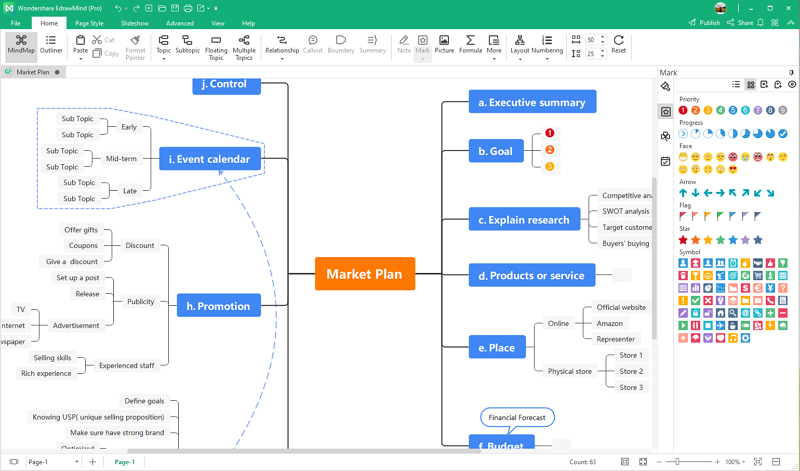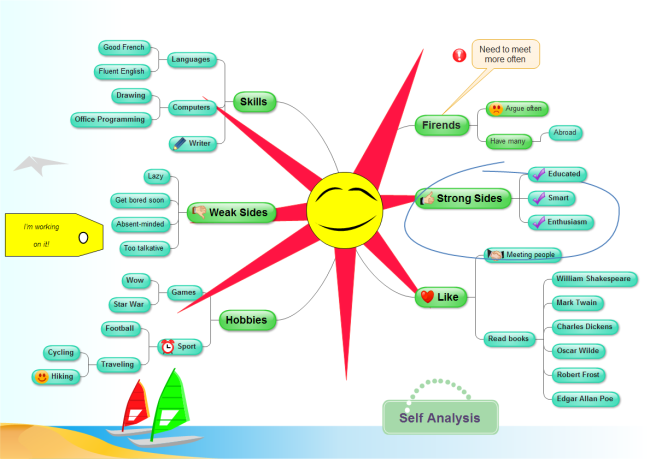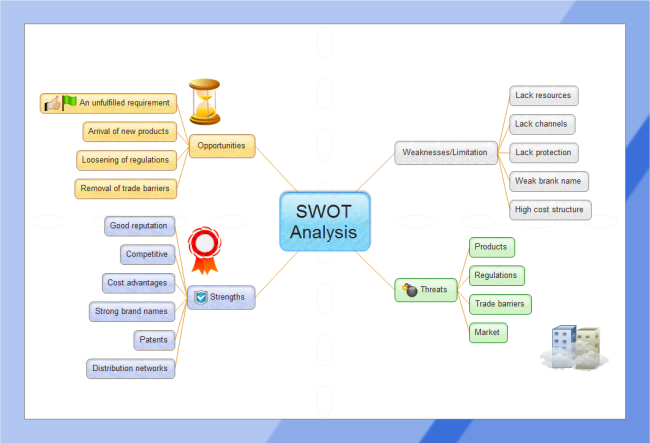Conduct Self-analysis Interestingly in Mind Map
Look at Yourselves Honestly and Gently
Maybe you have spent tons of time in analyzing your boss for promotion. Some people must have taken numerous time to think about what their companions like and please them. However, how much time have you given for self-analysis? It is well said that "The most fundamental aggression to ourselves, the most fundamental harm we can do to ourselves, is to remain ignorant by not having the courage and the respect to look at ourselves honestly and gently." (Pema Chödrön, When Things Fall Apart: Heart Advice for Difficult Times)
What to Analyze
First and foremost, be clear about what to analyze. Self-analysis can also be called introspection, self-contemplation, self-examination and self-concept. It consists of both our own evaluation as well as others' assessment of your adequacy. To be specific, the self-ideals are what we thought about ourselves. But the true self is what others see. In a word, your analysis should include personality, behavior, thoughts and desires objectively.
Your Own Comments
So take a deep breath and relax. Think about your perception of yourself. Self-contemplation can bring you fun since you can experience soul peace. Gradually, you will find that you are the best companion to yourself. No need to sugar-coat, just be completely honest because your objective analysis will enhance your self-improvement. Just like a famous American playwriter said, "Confront the dark parts of yourself, and work to banish them with illumination and forgiveness. Your willingness to wrestle with your demons will cause your angels to sing."
Make Conclusion in Mind Map
Last but not least, summarize all things you have collected and integrate them into a mind map to save it and use it to urge yourself to keep moving forward. This is an interesting way since you can experience awesome drawing experience by adding pictures, choose various themes or layout styles and export the mind map into other formats. You can categorize the information according to these questions:
EdrawMind provides you with some ready-made mind map templates that you can use for free.
More Tools for Self-Analysis
Besides mind map, there're a lot of other diagrams that can be used as self-analysis tools. SWOT analysis is one useful tool. See an example below.
Others' Opinions
Secondly, seek for others' comments. Besides your families or friends, you'd better ask some colleagues or your leaders for more comprehensive feedback. Don't do this by directly asking them what they see. Explain your objectives to them so that they will be honest and cooperative, otherwise they will just appeal to you for kindness. Remember that every coin has two sides so even terms that may sound negative have a positive side. For example, if somebody says you are obstinate, then you are not easily swayed, which can be a good quality in many cases. If you have sufficient time and want to get the most out of this exercise, you can design a questionnaire. For example, ask others which of the following personality terms apply to you. Through this way, you can be clearer about your weaknesses as well as strengths.
| Adaptable | Aloof | Aggressive | Amiable | Ambitious |
| Anxious | Arrogant | Assertive | Assured | Careful |
| Cheerful | Co-ordinated | Co-operative | Competitive | Confident |
| Considerate | Creative | Daring | Decisive | Dependable |
| Determined | Easy-going | Emotional | Encouraging | Enterprising |
| Extrovert | Fickle | Forceful | Forthright | Friendly |
| Generous | Gregarious | Hardworking | Helpful | Honest |
| Humorous | Ill-tempered | Independent | Innovative | Introverted |
| Judicious | Kind | Lazy | Mild-mannered | Objective |
| Obstinate | Open-minded | Orderly |
Original |
Patient |
| Passionate | Persistent | Prudent | Reliable | Reticent |
| Self-conscious | Self-reliant | Shy | Sincere | Systematic |
| Tactful | Tenacious | Trustworthy | Optimistic | Pessimistic |




